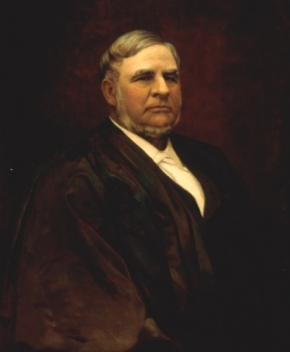You are here
Circuit Court Opinions:
Associate Justice David Davis, Whitney v. Janesville Gazette (1873)

Whitney v. Janesville Gazette, 29 F. Cas. 1091 (C.C.W.D. Wisc. 1873) (No. 17,590) [Seventh Circuit]
Whitney was a lawsuit for slander based on an article printed in a local Wisconsin newspaper. The paper ran an article regarding a fight between Whitney and a man named Tompkins, then went on to describe business dealings Whitney had with Tompkins and three others. Referring to Whitney, who was from New York, the author stated that “the sympathies of the public are with the victims of this professional swindler…. We understand that his ways are not as light as are those of good and honest men.”
Whitney sued for slander, and Justice Davis heard the case while riding circuit. In charging the jury, Davis noted that it was for the jurors to interpret the meaning of the words in question. For example, the charges may have been meant to describe Whitney’s dealings only with the men mentioned in the article or to his general business practices. “And it is for the jury to say whether or not the injury to Whitney is greater or less, according to the enlarged or restricted sense of these words, as they may find them to have been used,” he continued.
Davis further charged the jury that the publication would constitute a libel if it subjected the plaintiff “to reproach or disgrace in his business relations, either with specific persons or the public generally.” Malice need not be proved but would be implied if the accusations of swindling were false. The only viable defense was to show that the allegedly libelous statements were true in their entirety. Davis charged the jury that the defense had clearly not shown that Whitney was a “swindler” in his general business dealings. Nor was there any evidence to show that he had swindled three of the four men named in the article. Therefore, regardless of the intended meaning of the words in the article, the defendants had failed to demonstrate the truth of their assertions.
Under Wisconsin law, however, the defense could mitigate the damages by showing partial truth, i.e., that Whitney had been dishonest in his dealings with the fourth man mentioned, named Gookins. It was up to the jury, Davis explained, to weigh the testimony on this issue and decide whether Whitney had attempted to cheat Gookins. If not, the libel would in no way be mitigated. If so, the jury would have to determine the extent to which it was mitigated. Lastly, Davis charged the jurors that it was up to them to determine the extent to which Whitney’s reputation had suffered and that they could find, as the defendants claimed, that his “reputation has sustained no injury, because he had no reputation to lose.” The jury found for the plaintiff in the amount of $1,100. The case, while routine, was another example of a Supreme Court justice having to interpret and explain state law while sitting on a diversity of citizenship case in a U.S. circuit court.
